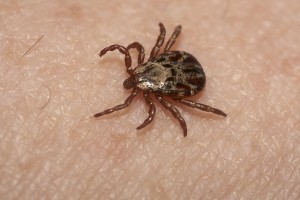HYANNIS – The weather has started to improve on Cape Cod and the Islands, which brings an increased awareness about the presence of ticks and the diseases they carry.
The region has some of the highest incidence of tick-borne illnesses and Barnstable County Entomologist Larry Dapsis said people need to be aware of their surroundings.
Dapsis said the region is about to enter the nymph stage of tick development, where they are smaller and less detectable.
“That nymph stage is active right about now until about early August,” Dapsis said. “And that stage is responsible for about 85 percent of tick-borne diseases. So we need to be particularly mindful now going forward.”
Ticks are not usually found in short grass open lawns that get direct sunlight.
“That is a pretty hostile environment,” he said.
Transitions from lawns in partial shade to shrubs, trees, higher grass are where they are commonly found.
“Shade, lower temperatures, higher humidity, that is where you are going to find the ticks,” Dapsis said.
While most people think that spring, summer and fall are the only times they need to be aware of ticks, their diseases can be spread year-round.
“They are active anytime there are temperatures above freezing with a break in snow cover and there is a risk of getting a tick bite and a disease,” Dapsis said.
Dapsis said the risk from ticks expands much further than just Lyme disease.
There are five pathogens that have been detected on Cape Cod, including the agents that can cause Lyme, babesiosis, Anaplasmosis, relapsing fever and Powassan virus.
“Does the number stop at five?,” he asked. “We believe that ticks could be transmitting organisms to people who might be getting sick and we don’t know why.”
Dapsis said it is important to keep yourself and your family protected while spending time outdoors.
“We try and make protection from tick bites and tick-borne illnesses as easy as getting up in the morning and brushing your teeth,” he said.
Dapsis says the best way to be protected from tick bites is to check for them after spending time outdoors and to wear permethrin treated clothing, which can kill ticks in less than a minute.
Local residents will also be able to participate in the “Take a Tick to College” program where ticks that have caused bites can be mailed to UMass Amherst’s Lab of Medical Zoology to be tested.
The program is once again being subsidized by Cape Cod Healthcare. UMass will test the ticks to determine if it has any of the known pathogens known to cause illnesses.

























